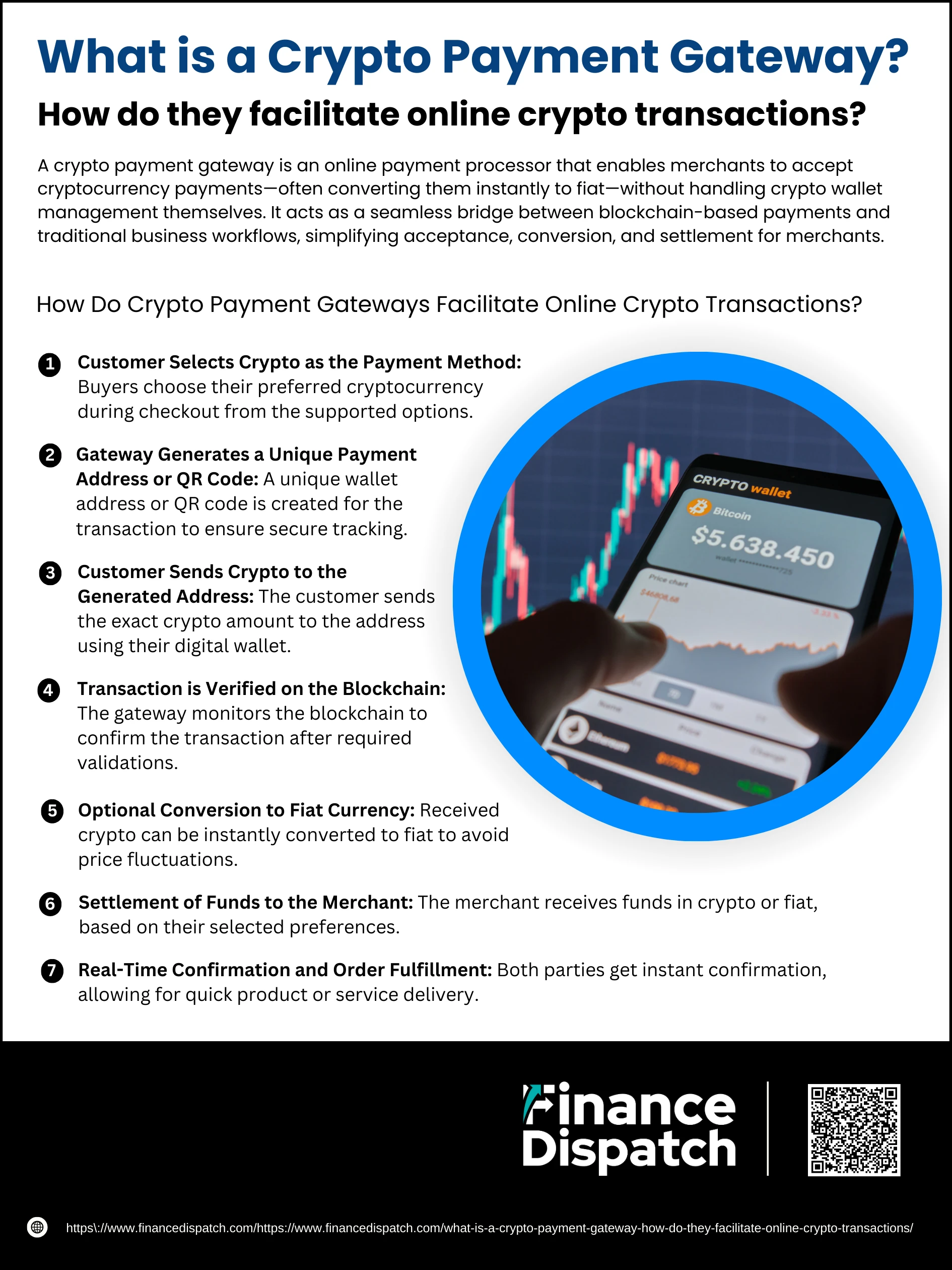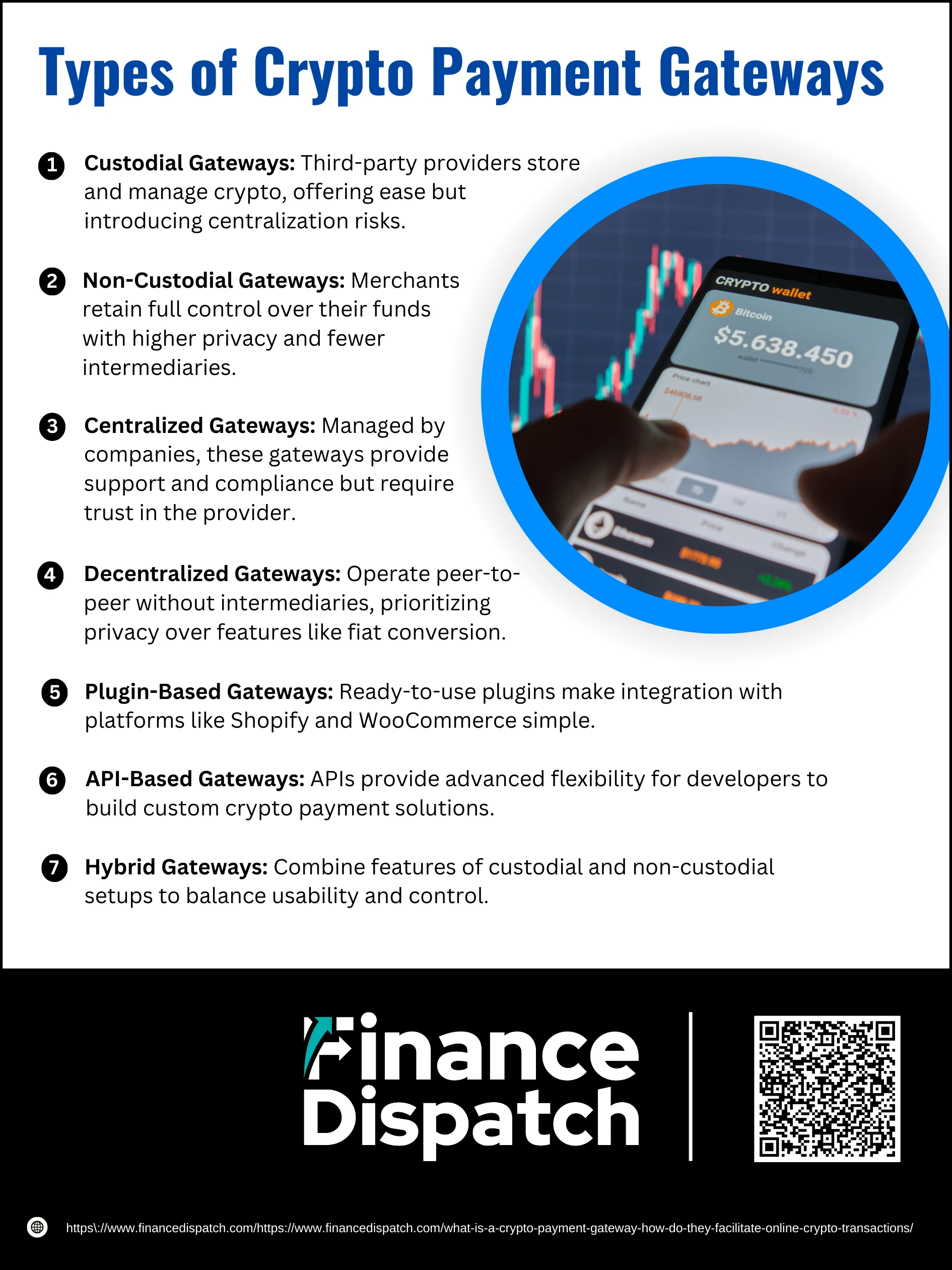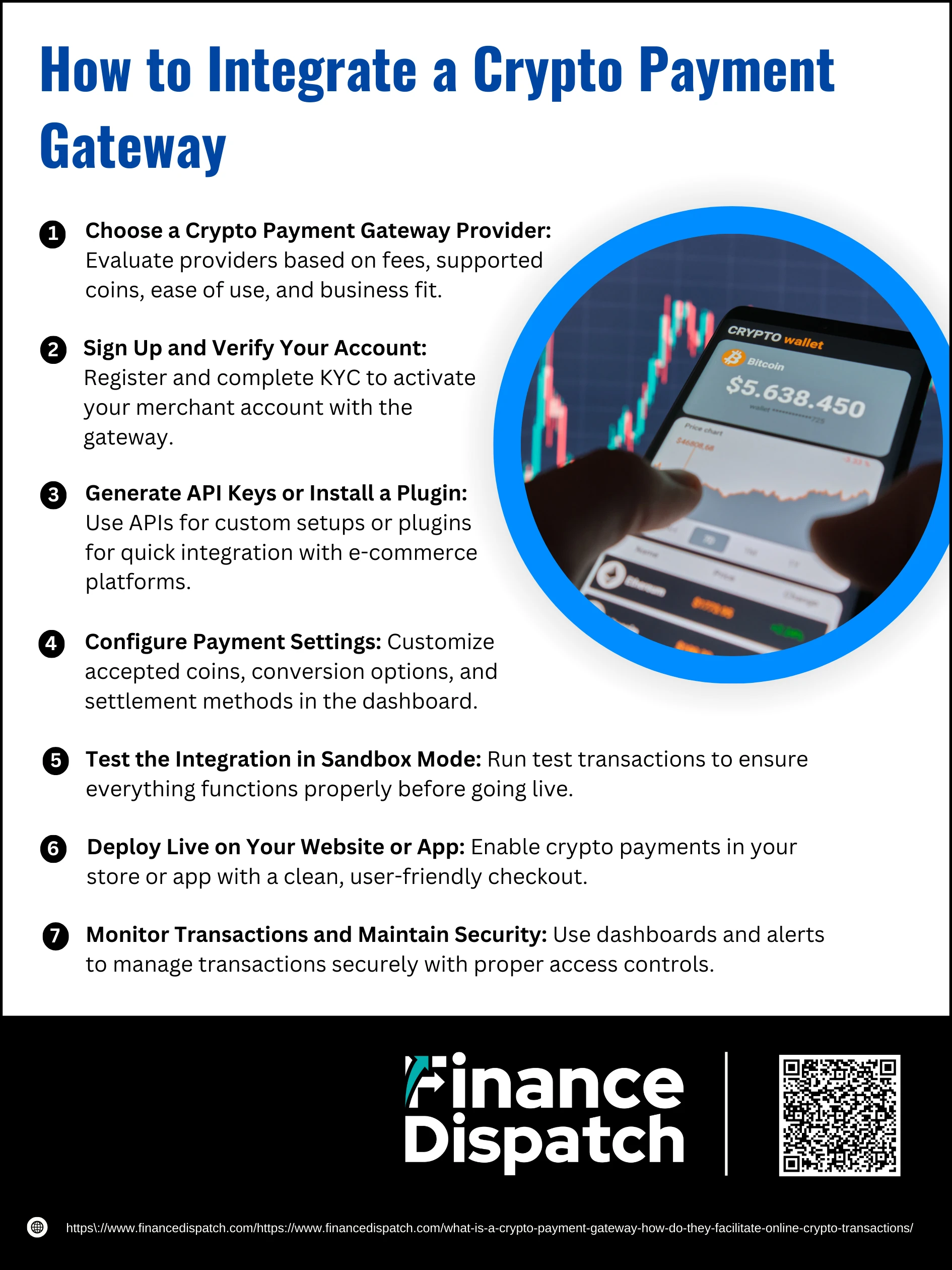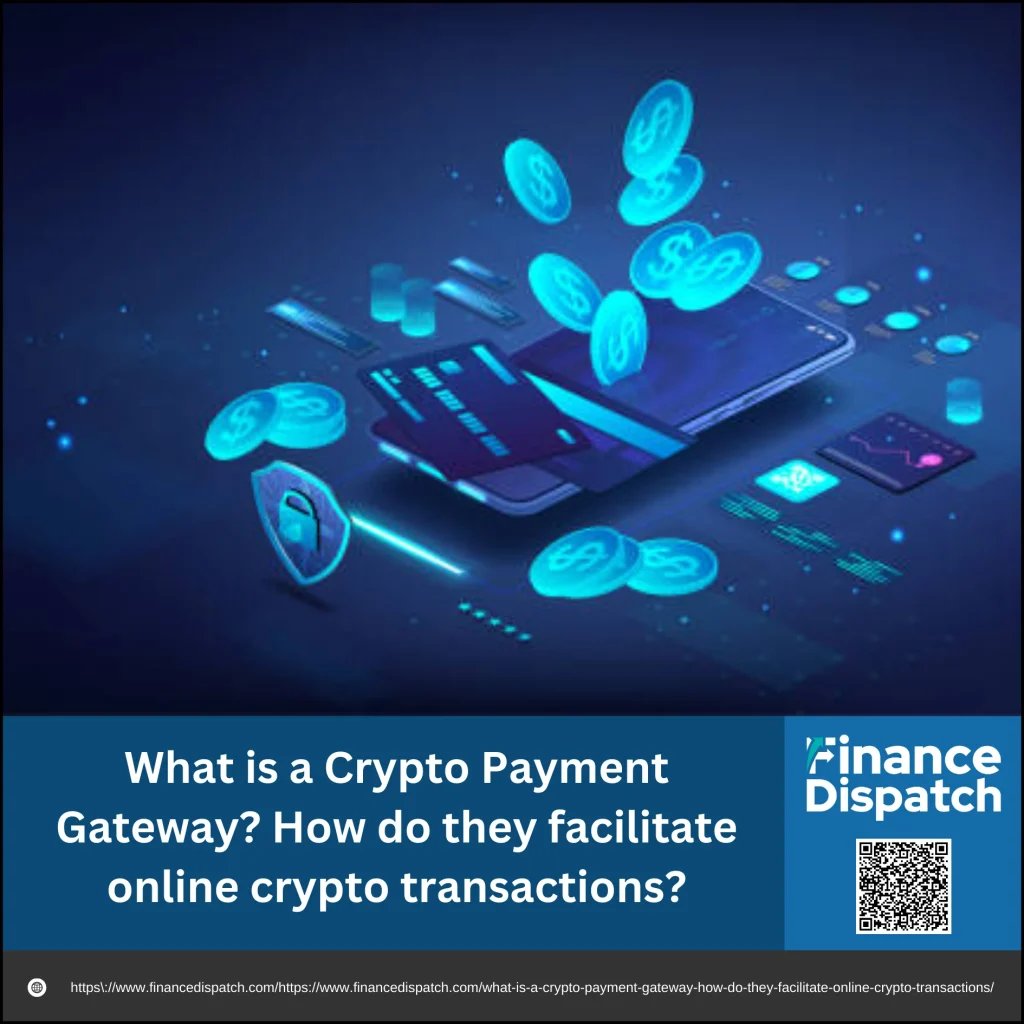In today’s fast-evolving digital economy, businesses and consumers are increasingly embracing cryptocurrencies—not just as speculative assets, but as practical tools for online transactions. However, accepting crypto payments requires more than just a digital wallet. This is where crypto payment gateways come in. These gateways serve as the bridge between merchants and the decentralized world of digital currencies, making it possible to accept crypto payments with the ease and security of traditional systems. In this article, we’ll explore what a crypto payment gateway is, how it works, and how it simplifies the process of conducting online transactions using cryptocurrencies.
What is a Crypto Payment Gateway?
A crypto payment gateway is a digital service that allows businesses to accept payments in cryptocurrencies like Bitcoin, Ethereum, or stablecoins. Similar to traditional payment processors that handle credit card transactions, these gateways facilitate the secure transfer of digital currency from a customer’s crypto wallet to the merchant. What makes them unique is their ability to convert incoming crypto payments into fiat currency—such as USD or EUR—either instantly or at the merchant’s discretion, reducing exposure to price volatility. By integrating directly with online stores or point-of-sale systems, crypto payment gateways eliminate the technical barriers of blockchain transactions, making it easy for businesses to offer cryptocurrency as a payment option without managing complex wallets or blockchain infrastructure.
 How Do Crypto Payment Gateways Facilitate Online Crypto Transactions?
How Do Crypto Payment Gateways Facilitate Online Crypto Transactions?
Crypto payment gateways are designed to simplify what would otherwise be a complex process of transferring digital currencies between customers and businesses. These gateways act as intermediaries that manage the technical aspects of blockchain transactions—such as address generation, transaction validation, currency conversion, and settlement. For merchants, they provide an easy-to-integrate solution that requires no in-depth knowledge of crypto wallets or blockchain infrastructure. For customers, they offer a smooth, fast, and secure checkout experience. Below is a step-by-step breakdown of how crypto payment gateways enable online crypto transactions:
1. Customer Selects Crypto as the Payment Method
During checkout on a website or app, the customer chooses to pay with cryptocurrency. The gateway displays supported coins—such as Bitcoin, Ethereum, or stablecoins—and the customer selects their preferred one.
2. Gateway Generates a Unique Payment Address or QR Code
To initiate the transaction, the gateway creates a unique blockchain wallet address or QR code specific to that order. This ensures the funds are securely routed and tied directly to the merchant’s system.
3. Customer Sends Crypto to the Generated Address
Using their digital wallet, the customer sends the required amount of cryptocurrency to the payment address provided. The gateway ensures that the amount and coin type match the order.
4. Transaction is Verified on the Blockchain
Once the crypto is sent, the transaction is broadcast to the blockchain network. The payment gateway monitors the network in real time, waiting for the necessary number of confirmations to validate the payment.
5. Optional Conversion to Fiat Currency
To reduce the risk of price fluctuations, the gateway can automatically convert the received cryptocurrency into a fiat currency like USD, EUR, or GBP. This ensures the merchant receives a stable value for the goods or services sold.
6. Settlement of Funds to the Merchant
After conversion (if enabled), the funds are deposited into the merchant’s account—either a crypto wallet or a linked bank account. The timing of the settlement may vary by provider (instant, hourly, or daily).
7. Real-Time Confirmation and Order Fulfillment
Both the merchant and the customer receive instant confirmation of the transaction status. This allows the business to ship products or deliver services without delay, creating a streamlined checkout experience.
 Types of Crypto Payment Gateways
Types of Crypto Payment Gateways
As cryptocurrency adoption grows, businesses have several options when it comes to choosing a crypto payment gateway. These gateways differ based on how they handle funds, integrate with existing systems, and the level of control they offer to users. Understanding the different types of crypto payment gateways can help merchants choose the best solution for their needs—whether they prioritize ease of use, full control, or regulatory compliance.
1. Custodial Gateways
These gateways manage and store cryptocurrency on behalf of the merchant. The provider controls the private keys, handles fund storage, and usually offers instant conversion to fiat. They are user-friendly but come with third-party risk.
2. Non-Custodial Gateways
Non-custodial gateways allow merchants to maintain full control over their funds and wallets. The gateway facilitates the transaction but does not hold the crypto. This offers greater privacy and security but may require more technical knowledge.
3. Centralized Gateways
Operated by registered companies or institutions, centralized gateways offer robust customer support, fiat settlement, and user-friendly interfaces. However, they are subject to regulations, and users must trust the central authority managing the service.
4. Decentralized Gateways
These operate without intermediaries, using peer-to-peer mechanisms and smart contracts to process payments. They align with the core philosophy of blockchain—privacy and control—but may lack features like fiat conversion and support.
5. Plugin-Based Gateways
Ideal for non-technical users, these gateways offer ready-made plugins for platforms like Shopify, WooCommerce, or Magento. They can be installed easily and configured with minimal effort.
6. API-Based Gateways
These are designed for businesses that need more control and flexibility. With APIs, developers can create custom payment workflows and integrate crypto payments into mobile apps or proprietary systems.
7. Hybrid Gateways
Some modern platforms offer both custodial and non-custodial options, along with fiat conversion and crypto retention features. These hybrid solutions aim to balance convenience, security, and flexibility for a wide range of use cases.
Key Features of Crypto Payment Gateways
Crypto payment gateways offer more than just a way to accept digital currency—they streamline the entire transaction process and make it accessible, secure, and reliable for both merchants and customers. These platforms are designed to simplify crypto payments, protect users from price volatility, and integrate seamlessly with online and in-store systems. Here are the key features that make crypto payment gateways essential tools for modern digital commerce:
1. Multi-Currency Support
Accept a wide range of cryptocurrencies such as Bitcoin, Ethereum, USDT, and more—broadening your reach to different customer preferences.
2. Real-Time Conversion to Fiat
Automatically convert incoming crypto payments into fiat currency (e.g., USD, EUR) to avoid volatility and maintain predictable revenue.
3. QR Code and Payment Link Generation
Easily generate scannable QR codes or shareable links for quick and secure transactions, especially useful in mobile and in-person payments.
4. Blockchain Transaction Monitoring
Track and verify transactions on the blockchain in real-time, ensuring transparency and fast confirmation for both parties.
5. Customizable Checkout Experience
Customize payment windows, branding, and supported coins to match your business’s look and feel.
6. Easy Integration with E-commerce Platforms
Use ready-made plugins or APIs to integrate with Shopify, WooCommerce, Magento, and other platforms without complicated setup.
7. Recurring Billing Options
Some gateways support subscription-based payments, enabling recurring billing for SaaS products or memberships.
8. Enhanced Security Protocols
Leverage encryption, two-factor authentication (2FA), and fraud detection tools to ensure secure transactions and protect customer data.
9. Detailed Analytics and Reporting
Access transaction histories, customer insights, and performance reports to help manage finances and make data-driven decisions.
10. Instant or Scheduled Settlements
Choose how and when you want to receive funds—whether as crypto or converted fiat—with options for daily, weekly, or instant payouts.
Advantages of Using a Crypto Payment Gateway
Crypto payment gateways are becoming an increasingly popular choice for businesses looking to modernize their payment systems and reach a broader audience. By handling the technical aspects of crypto transactions—such as blockchain validation, wallet management, and optional fiat conversion—these gateways make it easier and safer to accept digital currencies. Whether you’re a small online store or a global enterprise, using a crypto payment gateway comes with several key advantages.
1. Lower Transaction Fees
Unlike traditional payment processors that charge 2% to 4% per transaction, most crypto gateways charge between 0.5% and 1.5%, saving businesses money—especially on high-volume sales.
2. Faster Settlements
Crypto transactions can be confirmed within minutes, allowing businesses to receive funds much faster than traditional banking systems, which often take days to process.
3. Global Accessibility
With no need for currency conversions or international bank approvals, crypto gateways enable borderless transactions, helping businesses tap into a global customer base effortlessly.
4. Enhanced Security
Transactions processed through blockchain are encrypted and immutable, reducing the risk of fraud, chargebacks, and identity theft common with credit cards.
5. Reduced Risk of Chargebacks
Since crypto payments are irreversible once confirmed, merchants are protected from chargeback fraud, which is a frequent issue in credit card transactions.
6. Support for the Unbanked Population
Crypto gateways allow businesses to accept payments from customers who don’t have access to traditional banking systems but do have access to digital wallets and mobile devices.
7. Optional Fiat Conversion
Many gateways offer automatic conversion of crypto to fiat, protecting merchants from the volatility of cryptocurrency markets while still benefiting from crypto adoption.
8. Brand Differentiation and Innovation Appeal
Accepting cryptocurrency can position your business as forward-thinking and tech-savvy, attracting customers who value innovation and privacy.
Disadvantages and Limitations of Crypto Payment Gateway
While crypto payment gateways offer many benefits, they also come with certain drawbacks that businesses should carefully consider before integrating them. From regulatory uncertainty to technical barriers and market volatility, these limitations can impact how effectively a business uses cryptocurrency as a payment method. Understanding these challenges is essential for making informed decisions about adopting crypto payments.
1. Price Volatility
Cryptocurrencies can fluctuate dramatically in value, which means a payment received today could be worth less (or more) tomorrow unless instantly converted to fiat.
2. Regulatory Uncertainty
Crypto regulations differ from country to country and are still evolving, making compliance complex for international businesses.
3. Dependency on Third-Party Providers
Using a payment gateway means trusting a third-party service to handle transactions, store data, and secure funds—introducing centralization risks.
4. Security Vulnerabilities
If a custodial gateway is hacked or experiences a data breach, merchants could lose funds waiting to be settled in their accounts.
5. Limited Consumer Adoption
Despite growing interest, many customers still prefer traditional payment methods, meaning crypto may only appeal to a small segment of your audience.
6. Technical Integration Challenges
Setting up a crypto payment system—especially via API—can require technical knowledge or developer resources, which may not be readily available to all businesses.
7. No Chargebacks or Reversals
While this protects merchants from fraud, it also means there’s no way to refund a customer unless the business does so manually, which can complicate dispute resolution.
8. Transaction Fees During Network Congestion
Although base fees are lower, network congestion on blockchains like Bitcoin or Ethereum can cause gas fees to spike unpredictably.
Crypto Gateway vs Traditional Payment Gateway
As digital commerce evolves, businesses are increasingly comparing crypto payment gateways with traditional payment processors to determine the best fit for their operations. While both systems facilitate electronic transactions, they differ significantly in terms of technology, cost, speed, and control. Understanding these differences can help businesses make strategic decisions when expanding their payment options.
Comparison Table: Crypto Gateway vs Traditional Payment Gateway
| Feature | Crypto Payment Gateway | Traditional Payment Gateway |
| Currency Type | Digital currencies (e.g., Bitcoin, Ethereum) | Fiat currencies (e.g., USD, EUR) |
| Transaction Speed | Minutes (depending on blockchain confirmation) | Seconds to days (especially for cross-border payments) |
| Fees | Low (0.5% to 1.5% typical) | Higher (2% to 4% + flat fees) |
| Global Transactions | Seamless, no currency conversion needed | May involve foreign exchange fees and banking delays |
| Reversibility | Irreversible (no chargebacks) | Reversible (subject to chargebacks and disputes) |
| User Privacy | High (wallet-based, minimal personal info) | Low (requires full customer and card details) |
| Security | Secured via blockchain and encryption | Secured via SSL/TLS and fraud detection |
| Settlement | In crypto or auto-converted to fiat | Settled directly into merchant bank accounts |
| Integration Complexity | Moderate to High (depends on API/plugin setup) | Generally low to moderate (plug-and-play options available) |
| Regulatory Environment | Still developing and varies by region | Well-established and standardized globally |
| Customer Base | Niche but growing (crypto-savvy users) | Broad and universal |
Popular Crypto Payment Gateway Providers
With the rise in cryptocurrency adoption, numerous crypto payment gateway providers have emerged to help businesses accept digital currencies easily and securely. These platforms offer various features such as multi-currency support, instant fiat conversion, customizable APIs, and built-in security tools. Choosing the right provider depends on factors like fees, integration ease, supported coins, and geographic availability. Here are some of the most widely used and trusted crypto payment gateway providers in the market today:
1. BitPay
One of the earliest and most recognized crypto payment gateways, BitPay supports Bitcoin, Bitcoin Cash, and stablecoins, offering features like fiat conversion, invoicing, and POS integration.
2. CoinGate
CoinGate allows merchants to accept payments in over 70 cryptocurrencies and provides plugins for major e-commerce platforms like WooCommerce, Magento, and Shopify.
3. Coinbase Commerce
Developed by the popular crypto exchange Coinbase, this non-custodial solution lets merchants accept crypto directly to their wallets with no middleman.
4. NOWPayments
A simple and flexible gateway that supports 200+ cryptocurrencies with features like auto coin conversion, donation buttons, and recurring payments.
5. BTCPay Server
An open-source, self-hosted gateway that offers full control over funds and transactions. Ideal for developers and businesses prioritizing decentralization and privacy.
6. GoCoin
Known for supporting a variety of altcoins, including Litecoin and Dogecoin, GoCoin offers a range of merchant services and easy integration with e-commerce stores.
7. AlfaCoins
Offers fast and secure payment processing with features like fiat payouts, multi-currency support, and optional revenue splitting between stakeholders.
8. OpenNode
Focused on Bitcoin and Lightning Network payments, OpenNode is ideal for fast and low-fee transactions with instant fiat conversion available.
9. Paychant
A blockchain-native payment gateway that supports both web and mobile payments with integration tools tailored for African and emerging markets.
 How to Integrate a Crypto Payment Gateway
How to Integrate a Crypto Payment Gateway
Accepting cryptocurrency payments may sound complex, but integrating a crypto payment gateway is now easier than ever—thanks to user-friendly platforms offering plugins, APIs, and low-code options. Whether you’re a small business owner or a developer working on a custom payment system, a crypto payment gateway can help you accept digital currencies securely and efficiently. The process involves setting up a merchant account, configuring payment preferences, and embedding the payment interface into your website, app, or e-commerce store. Here’s a detailed, step-by-step guide to get you started:
1. Choose a Crypto Payment Gateway Provider
Begin by researching providers such as BitPay, CoinGate, Coinbase Commerce, or NOWPayments. Compare them based on transaction fees, supported cryptocurrencies, geographic availability, fiat conversion options, and ease of integration. Your choice should align with your business size, industry, and customer needs.
2. Sign Up and Verify Your Account
Once you select a provider, create a merchant account on their platform. Most reputable gateways will ask for basic business information and KYC (Know Your Customer) documentation to comply with regulations. This typically includes your business name, address, email, and in some cases, bank account verification for fiat withdrawals.
3. Generate API Keys or Install a Plugin
After account setup, access your merchant dashboard to generate API keys—used for custom integrations—or download plugins for popular platforms like Shopify, WooCommerce, Magento, or PrestaShop. API integrations offer greater flexibility and customization, while plugins are quicker and require minimal technical knowledge.
4. Configure Payment Settings
Define how you want to accept crypto payments. Choose which coins to accept (e.g., Bitcoin, Ethereum, USDT), set whether you want instant fiat conversion, and enter your wallet address or bank account details for settlements. Many gateways allow you to automate the process, send email receipts, and customize the payment window’s branding.
5. Test the Integration in Sandbox Mode
Before going live, most providers offer a test or sandbox environment where you can simulate transactions. This helps verify that the payment process is working correctly—from wallet address generation and transaction detection to confirmation emails and backend reporting.
6. Deploy Live on Your Website or App
After successful testing, switch to live mode. Enable crypto as a payment method at checkout and ensure that the user interface is clean and accessible. Consider adding trust signals like supported coin logos or “Pay with Crypto” badges to inform and attract customers.
7. Monitor Transactions and Maintain Security
Use the dashboard to monitor incoming payments, settlement reports, and transaction history. Set up real-time notifications or webhooks for instant order processing. Make sure your website uses HTTPS and that administrative access to your payment gateway is protected by strong passwords, 2FA, and regular security audits.
Future of Crypto Payment Gateways
The future of crypto payment gateways looks promising as digital currencies continue to gain mainstream acceptance across industries. With growing demand for faster, cheaper, and borderless payments, these gateways are expected to evolve beyond simple transaction processors into full-fledged financial platforms. Advancements such as Layer 2 scaling solutions, stablecoin integration, and smart contract automation will further enhance transaction speed, reduce fees, and improve reliability. As regulations become clearer and more standardized globally, businesses may find it easier and safer to adopt crypto payments at scale. Additionally, increased interoperability between blockchains and integration with decentralized finance (DeFi) tools will open new possibilities for merchants and consumers alike. Overall, crypto payment gateways are poised to become a vital part of the global financial ecosystem, bridging the gap between traditional commerce and the decentralized future of money.
Conclusion
Crypto payment gateways are revolutionizing the way businesses accept digital payments by offering a secure, fast, and cost-effective alternative to traditional methods. They simplify complex blockchain transactions, provide optional fiat conversion, and open up access to a global, tech-savvy customer base. While there are still challenges—such as regulatory uncertainty and market volatility—the benefits of flexibility, reduced fees, and enhanced security make them an increasingly attractive option for modern merchants. As technology matures and adoption grows, crypto payment gateways are set to play a key role in the future of digital commerce, empowering businesses to stay competitive in a rapidly evolving financial landscape.



